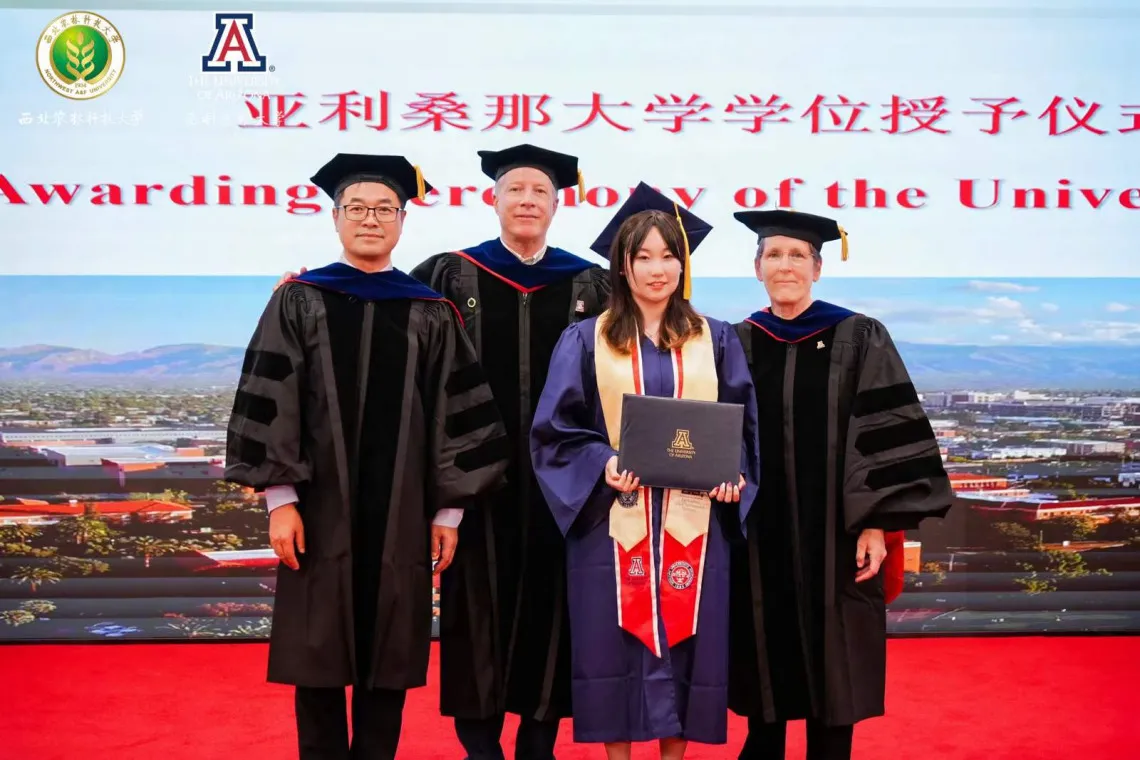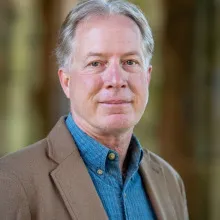Microcampus milestone: Environmental Science program based in China celebrates first graduating class

University of Arizona Associate Vice President for China & East Asia Affairs Charles Wang; UArizona Microcampus Director, NWAFU Ken Smith; CALES Outstanding Senior for Microcampus Programs Liu Siyu, and Department of Environmental Science interim head Joan Curry at UArizona-NWAFU Microcampus graduation June 17, 2024 in Yangling, China.
Launching a University of Arizona degree campus halfway across the globe comes with enormous challenges. Balancing different time zones. Navigating language barriers. Bridging cultural differences. But these bumps in the road were all eclipsed by the sudden onset of a global pandemic.
That was four years ago. The dual degree B.S. program in Environmental Science shared by UArizona and Northwest Agriculture and Forestry University (NWAFU) in Yangling, China, reached a milestone June 17, 2024 with its first graduating class of 82 students.

Ken Smith
Ken Smith, UArizona’s Microcampus Director at NWAFU, said the journey was difficult at times but ultimately rewarding.
“I’m proud of the students,” said Smith, also a Global Professor who teaches the 200-level ENVS classes at NWAFU. “I’ve gotten to know them pretty well over 2½ years, they made it through. They work pretty hard — taking a dual degree is not easy.”
The University of Arizona currently has 18 microcampus locations across the world, including five in China.
The College of Agriculture, Life and Environmental Sciences’ connection to NWAFU began in the spring of 2019 when a delegation of administrators and faculty from NWAFU visited Tucson seeking collaboration on dual degree programs.
Jon Chorover, CALES interim Associate Vice President for Research, was serving as head of the Department of Soil, Water, and Environmental Science (now Environmental Science) in 2019. He said the department’s superb reputation was key to NWAFU’s interest in UA.
“Our department is pretty well-known globally and NWAFU knew about us when they started looking to develop an environmental science program,” Chorover said. “It was an exciting opportunity and there was support and enthusiasm from our faculty.
“The U.S. and China are two of the largest and most powerful economies in the world, and in the realm of the environment, we are two of the most impactful countries. We both have large and substantial environmental and agricultural footprints, so maintaining an open dialogue between our countries is really important to both our economies and our understanding of the natural world and how best to care for it going forward.”
“It is incredibly exciting that our two world-class universities are collaborating on a dual degree program that is now celebrating its first graduates who will be leaders and job creators, addressing critical global challenges around the quality of our air, water, land, and food production,” CALES Dean Shane Burgess said.
Four Tucson-based UA representatives attended the June 17 graduation in Yangling, including Joan Curry, Environmental Science interim Department Head; Charles Wang, Associate Vice President, China & East Asia Affairs; Professor of Practice, James E. Rogers College of Law; Charlotte MacInnis, Assistant Dean, Curricular Affairs & Operations, International Education; and Min Zhou, Assistant Director, China and East Asia Programs.
“The graduation of the first four-year cohort marks a significant milestone for the program, demonstrating its viability and success while providing a model for future cohorts,” Wang said. “Impressively, over 70 percent of the graduating students have been accepted by world-renowned universities into graduate programs. Graduates of our programs become part of a growing network of environmental leaders, equipped to work in various sectors, including academia, industry, government, and non-profit organizations. This network contributes to continued collaboration and innovation in environmental science.”
Curry has been closely involved with the NWAFU program since the beginning; the trip to celebrate graduation was her first in-person visit to Yangling.
“It shows that it can be done,” Curry said of the first dual degree graduating class at NWAFU. “When NWAFU came to us, I don’t think we thought too much about the challenges. We saw it as an opportunity, and Jon said, OK, do you guys want to do this, and we said, why not. There were a lot of things to figure out, but (Ken Smith) has navigated the thing so beautifully; he has been the perfect person for the job.”
Smith took over as director of the NWAFU microcampus in August 2021 while the COVID-19 pandemic was still widespread, adding a major challenge on top of the work of starting an academic department from scratch.
“It took me four months to get a visa,” Smith said. “I was the only foreigner they let into the province that fall, and then I had to do a month of quarantine before I could get on campus. China was in and out of lockdown the first year, and teaching online in a second language (for the students), especially science classes, was pretty hard.”
Smith previously worked in Africa, Brazil and Canada while at the University of the South and speaks French and Portuguese, but the Chinese culture and language, of which there are 21 dialects, were entirely new to him when he started.
“I’m learning on the fly,” Smith said. “It’s going slow because everybody I work with speaks English so I’ve had to pick it up on my own. But when you leave campus and go into town, nobody speaks English.”
China lifted lockdown restrictions in December 2022, more than two years after the Environmental Science program started. It still took a while for life to return to normal—Smith said he was one of many people in Yangling, a city of about 400,000, who were infected with Covid when the country reopened—but it’s been a much smoother road since early 2023.
Smith now leads a department of six on-site faculty members, including Environmental Science assistant global professors Kevin Scriber, Daniel Tang, Cleophas Mecha, Dennis Amoah and Michael Pohlman, English global professor Jiahau Liu, and two program coordinators. The total enrollment of students at the end of the 2023-24 academic year was 332. Graduates of the program receive a U.S.-accredited degree from the University of Arizona in addition to their degree from NWAFU.
“It took a lot of work to get our entire team on the ground,” Smith said. “Now we’re fully staffed, fully operational, and everything’s running well. Our students are getting into very good graduate programs and our students have told us that it was clear that doing the dual degree program helped them advance, so that makes me feel pretty satisfied.”
This article was originally published on the College of Agriculture, Life and Environmental Sciences news page.

